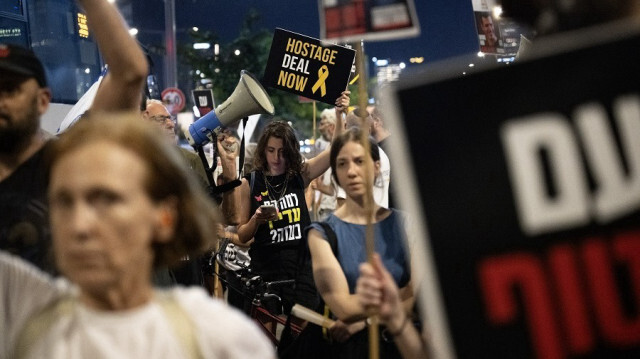
Hostages, who were taken from Khan Younis in southern Gaza, appear to have died of suffocation in tunnel where they were being held, claims Israeli daily Yedioth Ahronoth
An initial assessment of the deaths of six hostages, whose bodies were recovered from Gaza by Israeli forces on Tuesday, suggests that they died of suffocation caused by a gas leak in a tunnel during an Israeli army attack.
According to the Israeli newspaper Yedioth Ahronoth, the hostages, who were taken from Khan Younis in southern Gaza, appear to have died of suffocation in the tunnel where they were being held.
Their deaths are attributed to the result of an Israeli military strike, the daily said, without revealing the source of this assessment.
The newspaper claimed that the incident occurred about six months ago during an Israeli military attack in Khan Younis by the 98th Division.
Evidence collected from the scene late Monday and Tuesday supported this preliminary assessment, which is still being investigated, it said.
The report claimed that the army did not target the tunnel directly where the hostages were held but rather hit a Hamas target nearby, resulting in a fire and the subsequent release of lethal carbon dioxide gas inside the tunnel.
Several Hamas fighters were found dead alongside the Israeli hostages, armed with Kalashnikov rifles and showing no signs of injury, it said.
In response to inquiries, Israeli military spokesperson Daniel Hagari stated, “The incident is still under investigation.”
On Tuesday morning, the Israeli army, in coordination with the Shin Bet security agency, said it had recovered the bodies of six hostages from Khan Younis. They had been held in Gaza since Oct. 7.
The recovery sparked significant anger among the families of the Israeli hostages, who blamed the government of Prime Minister Benjamin Netanyahu for the deaths, arguing that timely negotiations with Hamas could have prevented the fatalities.
Later, the Israeli newspaper Israel Hayom reported that Tel Aviv is examining the hostages' bodies to determine whether they were killed by Israeli forces.
Before the announcement of the bodies' recovery, Israel claimed that 115 hostages were still in Gaza.
Flouting a UN Security Council resolution demanding an immediate cease-fire, Israel has continued its brutal offensive on Gaza since an attack last Oct. 7 by Palestinian resistance group Hamas.
The Israeli onslaught has resulted in over 40,170 Palestinian deaths, mostly women and children, and more than 92,740 injuries, according to local health authorities.
The ongoing blockade of Gaza has led to severe shortages of food, clean water, and medicine, leaving much of the region in ruins.
Israel faces accusations of genocide at the International Court of Justice, which has ordered a halt to military operations in the southern city of Rafah, where over one million Palestinians had sought refuge before the area was invaded on May 6.
Hello, the comments you share on our site are a valuable resource for other users. Please respect other users and different opinions. Do not use rude, offensive, derogatory, or discriminatory language.
The floor is all yours.








